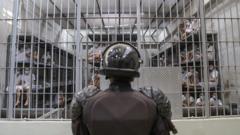In the wake of President Nayib Bukele's intriguing proposal to jail deported criminals from the United States, particularly U.S. citizens, the feasibility of such an arrangement remains a topic of controversy and scrutiny. On a stop in El Salvador during a Central American tour, Secretary of State Marco Rubio acknowledged that while Bukele's offer appears generous, legal hurdles abound regarding sending American citizens to foreign prisons.
Trump’s Deportees: A Possible Detention Deal with El Salvador

Trump’s Deportees: A Possible Detention Deal with El Salvador
El Salvador's President Nayib Bukele considers housing U.S. convicts, but legality and human rights concerns loom large.
Bukele’s jails have gained a notorious reputation for their harsh conditions and have become synonymous with his administration's aggressive stance against gang-related crime. However, human rights advocates warn that the administration's prisons are overcrowded and often detain innocents among the thousands arrested. Analysts doubt the proposal can gain legal traction in U.S. courts, particularly concerning American citizens, yet the discussion highlights a collaborative narrative of toughness toward criminals shared by both governments.
The offer raises significant questions about U.S. foreign policy in dealing with crime and punishment on a larger scale. While it remains to be seen whether any legal arrangements could be made, the dialogue serves both administrations' agendas, echoing a strong stance against crime that resonates with their respective bases.
The situation continues to evolve, leaving many wondering if this joint effort between nations will lead to real policy change or remain a mere theoretical exercise.
The offer raises significant questions about U.S. foreign policy in dealing with crime and punishment on a larger scale. While it remains to be seen whether any legal arrangements could be made, the dialogue serves both administrations' agendas, echoing a strong stance against crime that resonates with their respective bases.
The situation continues to evolve, leaving many wondering if this joint effort between nations will lead to real policy change or remain a mere theoretical exercise.






















